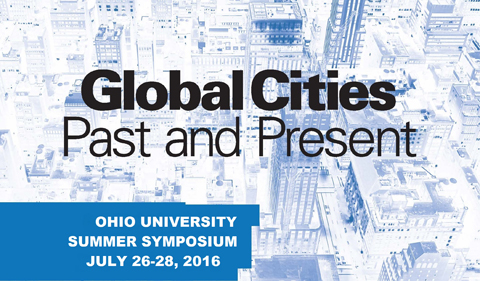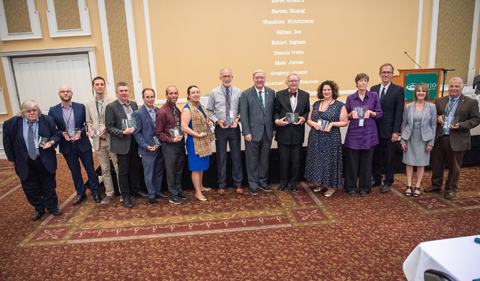
The Global Cities, Past and Present Summer Symposium is being held at Ohio University’s Center for International Studies on July 26 to 28, with many OHIO faculty giving talks.
Supported by an 1804 grant, the symposium brings together Ohio University faculty, graduate students, and members of the AHRC Global Cities International Research Network to discuss urbanization and globalization from a multi-disciplinary perspective. The participants of the symposium are urban studies researchers and scholars who work in the fields of anthropology, art history, communication, geography, history, literature, and political science.
The symposium will examine the idea of the global city and its usefulness and shortcomings to studies of the relationship between globalization, urban development, and the urban experience in the past and in our present. In particular, the symposium will explore the city as an actor in the historical process of globalization and a site for the investigation of globalization’s promises and challenges.
Carl Nightingale, professor of Transnational and Urban Studies at the State University of New York at Buffalo, will open the symposium on Tuesday, July 26, at 10 a.m. with a talk about urban segregation in cities of the United States and South Africa. Participants of the symposium will present their work on Tuesday, Wednesday, and Thursday, July 26-28, from 1 to 4 p.m. Presentations will explore the relationship between globalizing processes and the formation and definition of urban spaces; the development and uses of urban infrastructure; and perceptions and imaginings of the urban experience.
All events are at Yamada International House 009. This event is free and open to the public.
Program
Tuesday, July 26, 10 a.m.
Carl Nightingale (Transnational and Urban Studies, State University of New York at Buffalo)
“Visualizing Large-Scale and Diascalar Urban History: The Case of Urban Segregation in the US and in South Africa”
Tuesday, July 26, 1-4 p.m.
Emma Hart (History, University of St. Andrews) & Mariana Dantas (History, Ohio University), “Marginal spaces, people, and economies, and the 18th-century globalizing city”
Sarah Kinkel (History, Ohio University), “City Planning and the Politics of Space in the Early Modern Anglo-Atlantic”
Andrea Frohne (Art History, Ohio University), “Fitting the African Burial Ground in New York City Urban Space: A Global Perspective”
Wednesday, July 27, 1-4:30 p.m.
Yeong-Hyun Kim (Geography, Ohio University) & Jena Seiler (Interdisciplinary Arts, Ohio University), “The Best Connected and Most Vulnerable Cities: Global Cities, Globally Travelling Risks, and the “New York Ebola Crisis”
Marina Peterson (Interdisciplinary Arts, Ohio University), “Atmospheric: Noise, Infrastructure, and Indefinite Urbanism”
Elana Zilberg (Communication, University of California San Diego), “Global City Infrastructures: Urban River Revitalization and the Re-engineering of Los Angeles’ Racial Cartography”
Joseph Witek (Geography, University of Minnesota), “Mega Event Nearsightedness: long term legacies of the World Cup in Seoul and Johannesburg.”
Thursday, July 28, 1-4 p.m.
Joe McLaughlin (English, Ohio University), “Suburban Spaces and the Global Imagination in Late-Victorian London”
David Pike (Literature, American University), “The Slum Imaginary in Urban Studies and Beyond”
Matthew Layton (Political Science, Ohio University), “Perceptions of the Challenges of Urban Living in Latin America”



















Comments